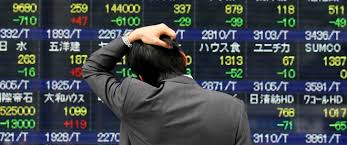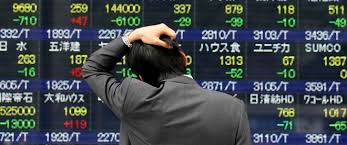
Six potential major surprises which, while outside its baseline scenarios, could shake things up, including a more retail spending and workers taking time off, have been pointed out by Nomura in a note this week even as Japan's economy has plodded along for a while.
Higher-than-expected inflation
Japan's bugbear for decades has been the absence of inflation. But now, oil prices were rising and expectations President-elect Donald Trump's policies will spur inflationary pressure and rising U.S. interest rates resulted in the dollar climbing.
"If the dollar continues to appreciate and crude prices continue to rise, the inflation rate in Japan could be much higher than expected," Nomura said. "We need to watch for the possibility that the financial markets could focus their attention on an exit strategy [from Bank of Japan policy] in periods when inflation is rising."
The BOJ eases even if inflation rises
Nothing that core CPI was set to turn positive as energy prices come off lows, Nomura didn't expect the BOJ would take active measures if inflation were to recover. But Nomura also noted the central bank could surprise.
"This scenario is one in which, having switched to a war-of-attrition strategy, the BOJ sees a recovery in the inflation rate as a rare opportunity and implements additional easing to encourage a weaker yen, spurring a rise in inflation," Nomura said.
The helicopter money debate goes airborne, again
Speculations emerged that helicopter money, combining fiscal and monetary policy, to counter a potential economic slowdown, that Japan could introduce around mid-year, Nomura noted.
In the year ahead, the safe-haven yen could be pushed higher amid a weaker global economy by risks, such as hiccups to U.S. fiscal expansion, efforts to weaken the dollar or election gains for Europe's protectionist political parties, Nomura cited.
"If there is major downward pressure on the Japanese economy and prices, the view could emerge that cooperative measures from the government and BOJ were necessary, and it would not be surprising to see the debate about helicopter money re-emerge."
"Great success" for Abenomics' growth strategies
Growth could surprise under two scenarios, Nomura pointed.
The note said that with the possibility Shinzo Abe could remain prime minister through 2021, Japan was poised for relative superiority on political stability. It said that risks of Europe's protectionist political parties gaining power and "deep-rooted concern" about the Trump administration re comparable.
When the base year for gross domestic product (GDP) was changed, Japan may raise its potential growth rate estimate, was the second scenario.
"An upward revision to the potential growth rate could lead to the view that opinions on the results of the growth strategies so far had been overly pessimistic," Nomura said. "If the growth strategies are shown to be producing results, they would be viewed more favorably, and this could increase momentum for growth strategies in the future."
Japan's consumers turn shopaholic
Nomura noted that since the consumption tax was boosted to 8 percent from 5 percent in April 2014, Japan's consumer spending has been weak. But suggesting the post-tax-hike rebound may have been sharper than believed, Nomura noted that, like with GDP, the benchmark year for comparing consumer spending will soon be revised.
Japan's workers work less
While Nomura noted the government was trying to rein in overtime hours, it doesn't expect Japan's long-running love-affair with extended work days to end soon
"Death from overwork has been a closely watched issue, and public scrutiny of companies that impose long working hours has become more intense. If companies do not address long working hours, they risk harming their brand and could be deterred in their ability to hire people," it said. "Some companies have begun efforts to reduce working hours. If these efforts become more widespread, we think they could warrant attention."
(Source:www.cnbc.com)
Higher-than-expected inflation
Japan's bugbear for decades has been the absence of inflation. But now, oil prices were rising and expectations President-elect Donald Trump's policies will spur inflationary pressure and rising U.S. interest rates resulted in the dollar climbing.
"If the dollar continues to appreciate and crude prices continue to rise, the inflation rate in Japan could be much higher than expected," Nomura said. "We need to watch for the possibility that the financial markets could focus their attention on an exit strategy [from Bank of Japan policy] in periods when inflation is rising."
The BOJ eases even if inflation rises
Nothing that core CPI was set to turn positive as energy prices come off lows, Nomura didn't expect the BOJ would take active measures if inflation were to recover. But Nomura also noted the central bank could surprise.
"This scenario is one in which, having switched to a war-of-attrition strategy, the BOJ sees a recovery in the inflation rate as a rare opportunity and implements additional easing to encourage a weaker yen, spurring a rise in inflation," Nomura said.
The helicopter money debate goes airborne, again
Speculations emerged that helicopter money, combining fiscal and monetary policy, to counter a potential economic slowdown, that Japan could introduce around mid-year, Nomura noted.
In the year ahead, the safe-haven yen could be pushed higher amid a weaker global economy by risks, such as hiccups to U.S. fiscal expansion, efforts to weaken the dollar or election gains for Europe's protectionist political parties, Nomura cited.
"If there is major downward pressure on the Japanese economy and prices, the view could emerge that cooperative measures from the government and BOJ were necessary, and it would not be surprising to see the debate about helicopter money re-emerge."
"Great success" for Abenomics' growth strategies
Growth could surprise under two scenarios, Nomura pointed.
The note said that with the possibility Shinzo Abe could remain prime minister through 2021, Japan was poised for relative superiority on political stability. It said that risks of Europe's protectionist political parties gaining power and "deep-rooted concern" about the Trump administration re comparable.
When the base year for gross domestic product (GDP) was changed, Japan may raise its potential growth rate estimate, was the second scenario.
"An upward revision to the potential growth rate could lead to the view that opinions on the results of the growth strategies so far had been overly pessimistic," Nomura said. "If the growth strategies are shown to be producing results, they would be viewed more favorably, and this could increase momentum for growth strategies in the future."
Japan's consumers turn shopaholic
Nomura noted that since the consumption tax was boosted to 8 percent from 5 percent in April 2014, Japan's consumer spending has been weak. But suggesting the post-tax-hike rebound may have been sharper than believed, Nomura noted that, like with GDP, the benchmark year for comparing consumer spending will soon be revised.
Japan's workers work less
While Nomura noted the government was trying to rein in overtime hours, it doesn't expect Japan's long-running love-affair with extended work days to end soon
"Death from overwork has been a closely watched issue, and public scrutiny of companies that impose long working hours has become more intense. If companies do not address long working hours, they risk harming their brand and could be deterred in their ability to hire people," it said. "Some companies have begun efforts to reduce working hours. If these efforts become more widespread, we think they could warrant attention."
(Source:www.cnbc.com)





